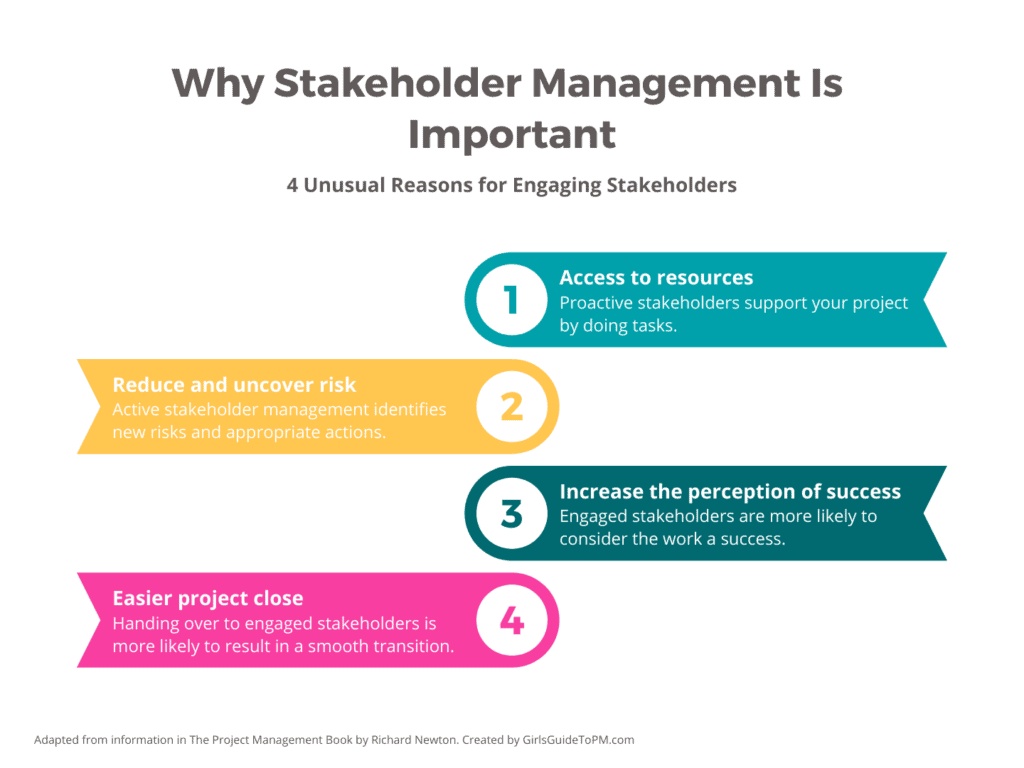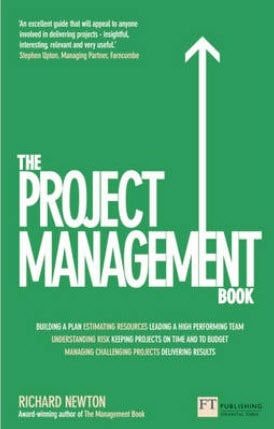4 Unusual Reasons Why Stakeholder Management Is Important
This blog is reader-supported. When you purchase something through an affiliate link on this site, I may earn some coffee money. Thanks! Learn more.
Why is stakeholder management important to project success?
Because we need people to get the project work done.
However, stakeholder management is a very narrow way of looking at how we work with people on projects to achieve a common goal. A better question would be, “Why is stakeholder engagement important?”
Let’s park that for the moment. I have a whole pack of information on stakeholder engagement on projects so for now, let’s focus on what’s commonly taught in project management courses, and look at stakeholder management.
What is stakeholder management?
All projects have stakeholders, even the very smallest initiatives. The major reason that most project management approaches give for doing stakeholder management is that it helps you understand more about the people who will be affected by the project.
That information then enables you to plan communication and engagement strategies to head off any problems while you adhere to the principles of stakeholder management.
You know the drill – map influence and interest, then work to try to move any negative stakeholders into the quadrant where they should be through interesting communication approaches and stressing the project benefits for them.
However, there are other reasons for doing stakeholder management. Richard Newton, in his book, The Project Management Book, sets out another 4 benefits of stakeholder management. Here they are.

1. Free Resources
“Proactive stakeholders effectively provide an extended team of additional resources (for free!),” he writes.
You can involve your stakeholders in any number of project tasks and delegate all kinds of things to them.
Want to do a presentation to Marketing but don’t have the time? Ask your most engaged Marketing stakeholder to do it for you. Need some help with the project budget? Get an enthusiastic stakeholder from Finance to talk you through it.
Tap into their skills and interest in the project. Anything from attending meetings, drafting communications, and carrying out other stakeholder engagement activities with their peers is fair game.
2. Reduce and Uncover Risk
“Good stakeholder management reduces some risks and makes other risks, which may otherwise by unnoticed, transparent,” Newton says.
The more you engage your stakeholders, the more you can minimize some risks, like poor take up when a new piece of software is launched for internal use.
Your stakeholders can also help you identify new risks. The more you talk to them, the more you’ll find out about what else is going on that could potentially impact your project.

3. Increase the Perception of Success
“Irrespective of actual project outcome, stakeholders who have been engaged and whose expectations have been managed are far likelier to perceive a project as a success than those who have been ignored,” writes Newton.
We all want our projects to be a success, don’t we? So it pays to engage with the right stakeholders all the way through the project, especially if it changes how they feel about the project at the end.
Projects don’t always deliver exactly what they set out to, so managing stakeholder engagements over the duration of the project is one way to help stakeholders adapt their expectations to what is realistic for delivery.
Read next: The Definitive Guide to Project Success Criteria
4. Easier Project Closure
“It eases benefits realization and the transition phase at the end of a project when deliverables are handed over to their owners,” Newton says.
This is very true – it is far easier to hand over deliverables to someone who knows a bit about them than to someone who is hearing about the project for the first time. The more you work with your stakeholders during the project, the more prepared they and their teams will be to receive the deliverables.
They are also less likely to reject deliverables for not meeting their standards, as they will have been involved in the production, testing, and checking of deliverables up to this point. There won’t be any surprises as they’ve seen the process the whole way through.

